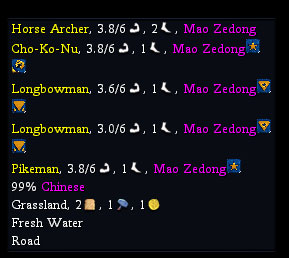Part 17

The pole fishers of the Malaria Coast, seen here along the beaches of Nanjing. Even under the modernizing influence of the Russian World State, they continue to preserve their ancestral practices and techniques.
Since the conquest of my people, southmen have used the word "Tourist" like a pejorative. They refuse to understand my exploration of the human landscape. My purpose is not to spy or to steal; it is only to search the world's distant places for the Buddha's wisdom.
When I was very young, I opened an unlocked door and stepped into the heart of a bakery. My senses were delighted. It was warm inside, and the place was filled with glinting metal and rough stones and the smell of cooking wheat. I found three young bakers, apprentices maybe, standing near an oven and rolling blobs of dough into balls. I asked one of them why they weren't kneading the dough, since it looked stringy and lumpy and unfit for good bread. Two bakers averted their eyes, and the baker that I'd addressed said, "Leave, Tourist."
By his age, I presumed that he wasn't the owner of the property, so I ignored his command. I walked past their kneading table and walked west along a wall until I found a metal stairway leading to the second floor. I was determined to understand why the Russian boys were making such terrible dough; I sensed wisdom behind their madness. I began ascending the stairs.
When I was halfway up the stairs, one of the young bakers ran into view and cursed at me in Russangxi. I paused and pointed to the door at the top of the stairway, and he sprinted up to me. I waited until he was at my side, and I asked him, "Is the owner there?" He pushed me aside and ran through the door. I followed him, only to hear the disappointing click of a lock slamming shut. I sighed, but I was not angry. Things were as they should be. That place was no longer public, and now that I couldn't reach it, I knew that Buddha wouldn't hide his wisdom there. I descended the stairs and walked east through a series of metal shelves covered in cooling breads.
After a minute or so, I came to a swinging door where a man was unloading massive sheets of metal covered in hundreds of sweet-smelling rolls. I followed him through the doors and saw the front of the bakery, a wide semicircle of glass cases filled with fresh breads and pastries. "Who are you?" asked the man. He paused in his work, looked me over, and noticed the compass in my hand. "Oh. Please stand aside Tourist, I'm busy."
"Why do the boys roll the dough when it requires kneading?" I asked.
The man balanced his sheet on a stool and picked up a heavy little roll. "Here," he said, and he tossed it to me. It had a strong nutty smell, and the top of the roll was peeling back in tight little strings of crust. I picked at one strand, and though the texture was terribly gummy, it tore free in one neat strand. I tasted the morsel, and it was delicious.
I quickly left the bakery then, for I had learned my lesson from Buddha. I swore to never resent my persecutors, because though things are not always perfect, but sometimes that's how things ought to be.
The Continued Short History of the Russo-Chinese War
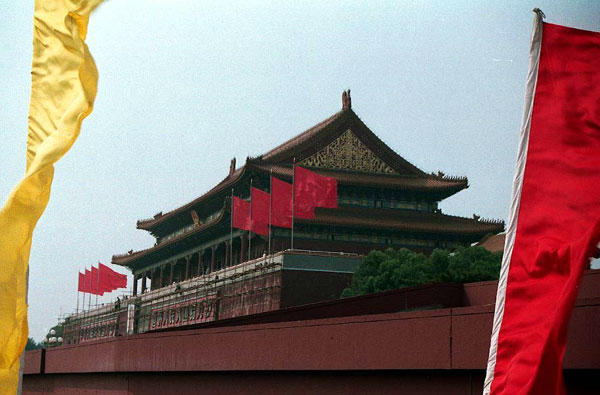
The Tomb of Mao the Emperor, the Courthouse of the Parthian, reconstructed by the Russians in the late Renaissance.
Viktor Vasnetsov's conquest of Xian had secured a direct route from the warforges of the Russian empire to the walls of the imperial capital of China, Parthian. Ilya Muromets's destruction of the Nanjing mines had unwittingly avenged General Svyatogor and Yegor, and had cut the stomach out of the Chinese war machine. Without fresh metal, it was merely a matter of time before the Chinese supply of arms withered away.
In these last decades of the war, the Russian old guard cleaned up the Chinese resistance. However, because of the great distance between the Russian production centers and the Yangtse Jungle, it was by no means an easy task.
Planning on the Imperial Capital
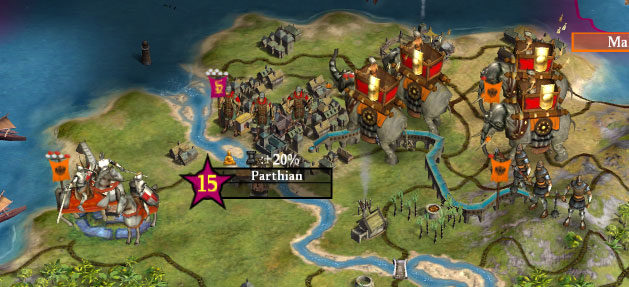
The battle position of the Russian forces around the Chinese capital.
General Vasnetsov's ultimate plan was the strategic equivalent of looping a noose around a sleeping man and closing it so quickly that his neck snaps. Out in the open, the general's knights and macemen were a superior force, but at the walls of Parthian, there was little hope of defeating the highly experienced Royal Guardsmen with an army of his size. Understanding the potential for a counterassault from the Chinese, he ordered his armies to set camp on the far side of the Yangtse in the city's river ports, so that any pikeman would have to ford the river and any longbowman would have to leave the walls. Then he sent a messenger to the east to organize with Ilya Muromets for a pincer movement against the city.
Normally, it would normally be a great risk to march past Nanjing to the Imperial Capital while leaving the local governor and his forces unharmed. But Ilya Muromets believed that this war was anything but normal. After two decades of pillaging without meeting any organized resistance from the Chinese, he thought that the governor at Nanjing was incompetent, or worse, a coward. Boosted by his belief that "the banana-eaters had neither the heart nor the soul to attack his forces from the rear," he agreed to Vasnetsov's plan. His role was pivotal--using the elephants, which were capable of surviving in the harsh jungle, he was to march past Nanjing and into the grasslands east of Parthian, where villages and workshops were producing gear and supplies for the Imperial Capital. With these precious regions cut off from the capital, Vasnetsov hoped that military growth in the capital would stagnate completely.
Of course, Parthian was far too large to legitimately siege with such a small force. Vasnetsov left both the forests south of the city and the north coast completely undefended. Food and commerce continued to enter Parthian, even as the land west of the city was turned into a series of battlefield trenches by Russian engineers. Over the course of several months, the western districts of Parthian were abandoned because of catapult bombardment, and though this created disorder and strife within the capital, it did not significantly affect the Chinese defenses. In sum, Vasnetsov could not ring the entire city, but he could squeeze it until it exploded into chaos--a potential opportunity to capture or kill Mao.
A Sudden Attack from the Rear
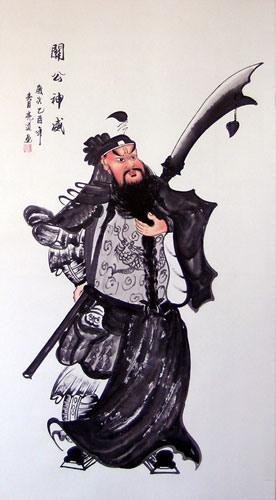
The famous assassin, Jing Ke, drawn in ceremonial dress.
On a routine inspection of his army in 1319 AD, Ilya Muromets was passing through the ranks of his elephant rearguard led by Captain Kotan, when he suddenly vomited and passed out. His soldiers managed to revive him after a few minutes, but he was delirious and frightened, and demanded to be returned--despite the possible medical dangers--to his tent over fifteen miles away. His lieutenants reluctantly agreed, and he left the rearguard on the back of Kotan's bull elephant only half an hour before the governor of Nanjing sprung his trap. A Chinese force of 200 longbowmen and 100 pikemen caught up to the rearguard and swept through them with sheer numbers, but not before the Russians managed to send a message after Muromets saying, "Nanjing is coming."
Captain Kotan fought valiantly. Though he lacked an elephant, he managed to command his forces by stripping off his armor and running around the battlefield on foot. He organized an aggressive defense capable of killing as many longbowmen as possible before the pikemen managed to down the rest of the elephants and trap the Russians in the dense foliage of the jungle floor. In a brilliant tactical maneuver that ended the life of an estimated ninety Chinese longbowmen, he manned his elephants with a skeleton crew and sent them into a suicide charge against the pikemen, while pushing eastward with the rest of his force on foot. Shielded by the dark forest canopy, the Chinese longbowmen's concealed positions proved to be inadequate for sighting, and Kotan managed to suddenly engage a regiment of them in short range combat. The elephant archer's shortbows were weaker than the Chinese longbow, but it was much easier to fire. Within fifteen minutes, the Chinese longbows were annihilated by the simple arithmetic of arrows fire per a minute, while Kotan's men were merely decimated. Unfortunately, this attack was too little, too late. Kotan was eventually struck by an arrow, and he died with his face planted into the forest floor. The rest of his men were slowly ground away, and though the Chinese victory was Pyrrhic, it was complete.
When Muromets recieved the message, he knew his paranoia had paid off. In the hills only five miles south of the rearguard, he had placed his macemen in a defensive position to protect himself against any flanking attempt. He immediately ordered them to assault the Chinese attackers before they had time to recover from their assault on the rearguard, and under the command of Captain Czriniu, the macemen attacked the left flank of the disordered Chinese soldiers.
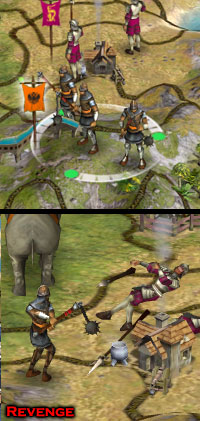
Though the individual longbowmen proved to be an adequate threat, two hundred macemen were more than enough to eliminate the remainder of their number and the pikemen which they protected. The details of the battle are inconsequential; suffice to say, Czriniu gave only one command: "Spread out into a line and march forward until you've killed every Chinese man between you and the plains."
Muromets spent the next four days in his bed while suffering from "the assaults of demons upon [his] head." Modern analysis suggests that he was suffering from a series of extremely severe migraines, which explains his inability to swallow much food or water, and his complete lack of sleep. Worse, Muromets was an ancient figure, well over 73 years old and nearly 74, and the ordeal took a terrible toll on his fragile health. His doctors and alchemists reccomended that he take off his armor and rest properly, but Muromets sternly refused to doff it. In his journal, he wrote, "If I ever remove my cuirass, then that will be the day an assassin knifes my heart."
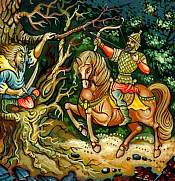
A painting of Ilya Muromets, depicting him on a fictional hunt in his middle age.
At about two in the morning on the fourth night since the assault on the rearguard, decades of Ilya's paranoia were justified. A Chinese assassin, Jing Ke, had survived the battle with Captain Czriniu and had covered himself in a blanket of leaves, mud, and dark grey cloth. Every night he had eaten a biscuit, drunk from a bottle of liquor, and crawled towards Muromets's tent. He had stopped during the day to sleep under the cover of the foliage and his primitive ghillie blanket, and he had awoken at dusk to resume his advance.
On that night, he leapt up and ran the last seventeen feet, slaying two Russian guards with a spike-machete before meeting General Muromets. One of the guards let out a cry as he died, raising the alarm and assuring Jing Ke's eventual death, no matter what occurred.
What occurred is legendary. At the age of 73 and suffering from a brain tumor that had likely become cancerous, Muromets should have been completely incapable of standing in his full battle armor, let alone fighting back against a young Chinese assassin carrying a spike-machete (a one-bladed sword with a large hooked spike on the tip used for piercing heavy armor.)
According to the eyewitness account of the general's unarmed manservant, Muromets seemed to shed fifty years as he tossed aside his blanket, leapt to his feet, and drew his blade. Jing Ke's bold first swing came without hesitation. He aimed to pierce the soft side of Muromets's armor with the hooked spike, but in one clean motion, Muromets parried the strike and rolled his sword straight up to Jing Ke's hilt. The simple Chinese handguard was caught in the ornate lacy decorations around the edge of Muromets's handguard, and heaving, the general stripped the assassin of his sword.
Jing Ke seemed to panic for a moment, but he was fast on his feet. He dodged a clumsy upswing from the general and darted in under Muromets blade. The secondary weapon Jing Ke carried was a pick designed by Chinese artisans to penetrate even the thickest plate, and his expert hands guided it towards Muromets's heart. The point of the pick disappeared as Jing Ke leaned against Muromets, and the old man reeled from the blow.
The manservant cried out and turned to run, when he heard the general gasp, "I'm dying!" He turned to look and saw Jing Ke leaping back from the general's soon-to-be-corpse. However, the general was not done. He pushed himself up onto his knees and lunged at Jing Ke, thrusting between the assassin's legs and raking his sword across the assassin's thighs. Jing Ke's instinctual reaction sent him twisting to the left, pulling the general's sword straight through to his bone and crippling himself instantly. He collapsed to the ground and lay prone away from General Muromets, and passed out from blood loss as his femoral arteries drained. The General raised himself to his feet, pulled his sword out from under Jing Ke, kicked the mortally wounded man in the ribs, and then pierced him a few times in the lungs for good measure.
For the next few minutes, the general seemed unphased by the pick hanging out of his chest. He lay back down in his bed and summoned his lieutenants, and in a clear voice, he told them exactly who would command what regiments after he died. His primary follower and the new general, Fusik Fenia, exclaimed, "Ilya, how do you survive that wound?" The general ignored his question, finished dibbying up his command, and then fell asleep.
Though Muromets would breathe for the next two days, he would never wake up. After he grew cold, the new General Fenia personally pulled the pick from Ilya's chest in order to understand how the old general had lived after a mortal wounding. In the end, however, it seemed that the pick had never pierced the general at all. Under his plate he had worn another twenty-pound vest of chainmail, which had bent the pick into a crescent and prevented the Chinese weapon from breaking his skin. Fenia couldn't understand why his mentor had died, but he was happy that Ilya had been spared the agony of dying from an assassin. The official history attributed his death to the shock of combat in his old age, but in truth, it is likely that he suffered from a series of strokes and slipped into a fatal coma.
Whatever the case may be, Ilya Muromets's death did not demoralize his men. Rather, his boldness and incredible martial prowess instilled in them a sense of hope and comraderie. If the general could fight a Chinese expert when he was sick and old, then the rank and file soldier felt like he could conquer the Chinese nation.
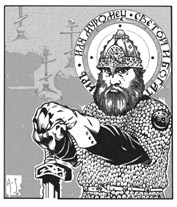
Ilya Muromets became a symbol of the Russian spirit of war, and is often depicted in modern military propaganda.
The Assault on Parthian, and the Escape of Mao
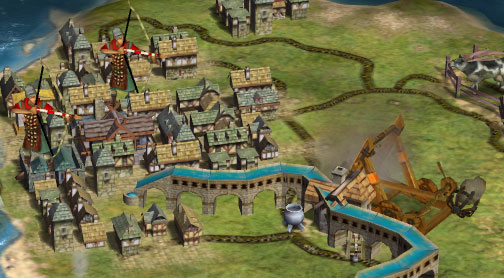
Grozny Catapults fire grapeshot within range of Chinese longbows.
In 1333 AD, the noose had drawn tight around Parthian. General Fenia had taken up the reins of Muromets's elephant, and easily completed his task of moving in elephants and catapults to the eastern border of the Imperial Capital. However, in order to complete this plan, he had to sacrifice almost half of Captain Czriniu's macemen in extended rearguard fighting, which brought a heavy toll on Czriniu's forces. By the time Fenia was setting siege to the eastern districts of Parthian, the Captain's regiment had dissolved.
In the west, Viktor Vasnetsov prepared for his counterworks for the final assault. Long zig-zagging bands of trenches allowed his men to approach all the way to the river without falling victim to the Chinese longbowmen. After that, they would have to ford the Yangtse under fire and then overrun the Chinese defenses in close combat. There was no other grand strategy except that of the meatgrinder. The Imperial Capital would be taken by the mob, or it wouldn't be taken at all.
On April 20th, 1333, the final assault began. The morning was clear, crisp, and dry. Soldiers on both sides of the war were well fed, well trained, experienced veterans who were well aware of what was about to come. There was no fight that was more fair than this.
All four runs of Grozny catapults, some of which contained refurbished pieces several centuries old, were loaded with grapeshot and sent into bombardment range. For two hours, over 800 catapults slung approximately 3000 tons of grapeshot and 1000 tons of regular rock at the Chinese defenders. The Chinese longbowmen used cover as best as they could, and they systematically burned every catapult in all four runs--but at a terrible cost. Almost half of all Chinese defenders were wounded in those first two hours, and a tenth of them died. Despite their superior position, the Chinese were severely weakened.
So began with what is later described as "the greatest battle of medieval warfare." General Vasnetsov ordered his knights up the trench, following by his macemen. Like great termites through an earthen hive, they marched in slow, methodical numbers. Though any given man might die at any moment, as long as the march was steady and orderly, the greatest number would survive to fight, and maybe even live to conquer Parthian. The Chinese attempted to drop arrows into their midst, but they carried shields above themselves, and like rain against the carapace of a beetle, the arrows splashed off them harmlessly.Aside posted:
I sacrificed four catapults and reduced the defenders from perfect defense to this:
Notice that almost all of them are reduced to 3.9 out of 6. This is a third weaker than before the catapults were sacrificed. Now to see if my forces can crush them.
Simultaneously, the thinner defenses of the east side were assaulted by all the remaining elephants of Fenia's forces. It is said that their stampede was like thunder, and that many guardsmen who had never seen an elephant tossed down their weapons and fled in terror of the lumbering, massive beasts. Even across the great city, Vasnetsov was heartened to hear the trumpeting of Kotan's famous bull as it lead the charge against the Chinese.
Four hundred elephants thundered into the defenders of Parthian. There was no preferred tactic for every fighter, nor a brilliant strategy. The elephant archers shot at pikemen and the elephant drivers attempted to demolish any building or tower used by the longbowmen. Sometimes the skill or numbers of the Russians prevailed, and the Chinese were scattered and crushed under the flat feet of the beasts. Other times, the Chinese had the advantage, and the elephants were slain with their riders; their corpses formed a temporary block amongst the narrow alleys of the eastern slums.
General Fenia penetrated the deepest before he died. Around him, around Kotan's famous bull, Chinese longbowmen used planks to run from rooftop to rooftop and fire at him. He personally slew seven men with the shortbow before he was caught in an ambush beside a public fountain. As his driver pulled the elephant around the stone fountain, an ingenius [sic-filter] device made from Chinese fireworks detonated. Though the explosion was relatively harmless, it terrified Kotan's bull elephant and sent it into a frenzy. Fenia snatched the reins from the driver and tried to control the animal, but only managed to crash it into a nearby villa. The roof of the building came down onto the bull's head, and the swaft of debris from the impact swept the rider's basket from atop the elephant. Fenia died from the fall.
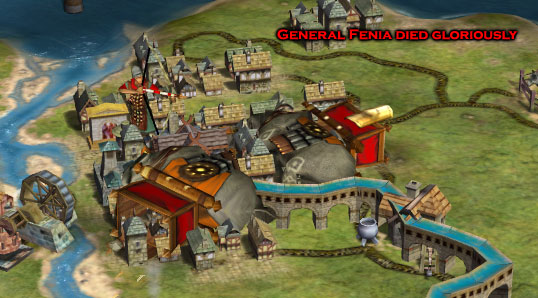
The assault kills Fenia, but destroys a full regiment of longbowmen.
Three hundred knights under Lord Magnus were the first to ford the river. This early in the spring, the Yangtse was still seasonally low, and wouldn't flood until May. The horses were capable of driving swiftly through the water, and though several dozen fell during the crossing and dragged their armored knights down to into the water, most of them passed through to the outer defenses and set about terrorizing the defenders. Unlike the Eastern slums with flat roofs, the western districts were covered in slanted structures unfit for defense. Hence, the longbowmen had mostly thrown up towers from which to fire upon the Russians. Unfortunately for the Chinese, taking down a tower was as simple as hitching a grapple to one of the tripods and whipping the horse. Realizing the danger, many defenders climbed down and tried to use doorways and windows as firing nests, only to discover that the knight's plate armor and the close ranges made it difficult to eliminate a Russian before he was cutting you with his sword.
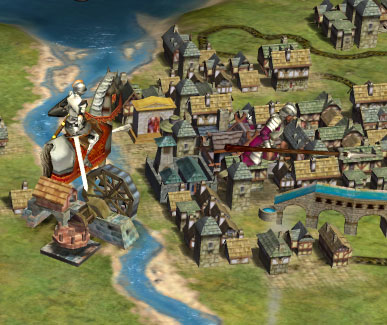
The fighting was merciless.
The knights under Lord Kavkaz, Lord Snevir, and Lord Feliks followed after the initial assault. Under Savnetsov's orders, Kavkaz's men spread out and began slaughter anyone found in any house beyind Magnus's lines, no matter how innocent they might seem. He managed to find and eliminate over one hundred and eighty-two longbowmen over the next hour and a half.
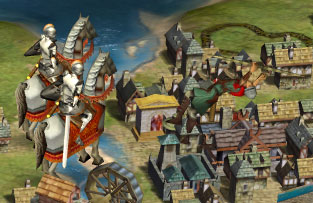
Lord Kavkaz's knights eliminate Chinese defenders.
At this point, the Imperial Guardsmen were routing and dispersing back into the native population. By noon, Savnetsov had moved all his men into the outskirts of the city, and was now fighting a protracted street battle to reach the palace. Chinese Cho-Ko-Nu crossbowmen proved to be an aggravation which seemed impossible to eliminate, but their hindrance was not fatal. Vasnetsov had his knights advance up a block followed by sweeping teams of macemen. Anyone who wasn't scattered by the knight's advance was rooted out and mutilated by maces. Around two in the afternoon, they had reached the palace gates, and the assault on the palace began.
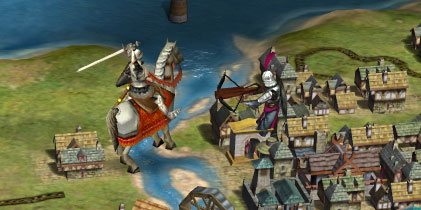
Knights face off against Cho-Ko-Nu in extended urban combat.
Viktor Vasnetsov's pincer movement worked beautifully. The palace at Parthian was ill-constructed by comparison to the much older palace at Beijing, and the inner defenses, while similarly manned by catapults, proved to be worthless. Almost all of Mao's royal guard had spent themselves fighting on the edge of the city, and Vasnetsov's macemen were virtually uncontested as they scaled the walls and opened the palace gates.
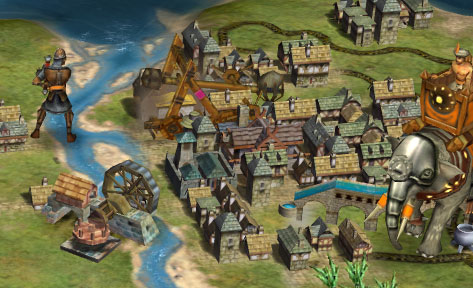
Vasnetsov's macemen defeat China's defensive catapults while the elephants of the recently deceased Fenia approach from the rear.
Inside the palace, over 150 of Mao's very best guards waited in decorative parade armor. Their regiment tightened into a double-circle as the veteran Russian knights approached and dismounted from their horses. In a handful of minutes, Vasnetsov ordered the attack, and the Russians charged into combat. In this final stand, the fundamental Russian advantage returned to haunt the Chinese. Chainmail and studded leather were incomparable to full plate, and in this fight, it was the hands of distant crafters that turned the tide. The Russian empire, as old and rich as the Chinese, was better organized and more advanced. Five thousand years of progress preceded this moment, when Russian swords cut through Chinese armor, and Chinese cleavers broke on Russian platemail.
Methodically, painfully, the last vestiges of the Chinese military died. The last soldier, the Imperial Standard Bearer and High General of the Chinese forces, stood at attention while the Russians surrounded him and pulled his banner from his hands. Ashamed, he threw himself at the feet of a knight, and waited for the approach of the Russian leader. Vasnetsov, with characteristic grace, demanded the High General's helmet rather than his head. The helmet exchanged hands, and the Chinese military was defeated.
But Mao was not dead.
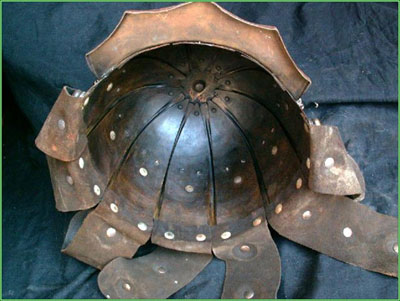
The Helmet of the High General, on display at the World Museum in Moscow.
An Interlude in Saxon
The son of the original Duke of Crimea, Duke Igorevich II, took the village of Saxon a season after the fall of Parthian. He was a relatively incompetent leader, and he required a force of over 1000 men to surmount the weak defenses of the undersupplied, demoralized Chinese defenders. After slogging through the mountain foothills for three months, he conquered Saxon on the Summer Solstice, now called the Bloody Long Day by Saxon villagers. The battle is ironically celebrated by the locals, with drinking and feasting.

A view of Saxon beneath the snow-capped peak of Mt. Barbaros.
Revenge at Nanjing
The conquest of Nanjing is considered important, but it is also one of the least significant events in the history of the Russo-Chinese war. Their assaults on Muromets's rearguard had drained the city's coffers and exhaused their remaining military supplies. Only six months after the conquest of Parthian, two hundred of Vasnetsov's knights "assaulted" the city. The defenders surrendered the moment the Russians arrived, and they turned over their own governor to the invaders.
Because of their complicity, only three things happened to the Chinese at Nanjing: their unmanned catapults were destroyed, all their remaining gold was transferred to Russian hands, and their governor was dragged behind a horse until his skin was flayed from his body. After he died, his corpse was nailed to a stiff board and set along the main street, where Russian soldiers took their vengeance by pissing on him.
The Hunt for Mao
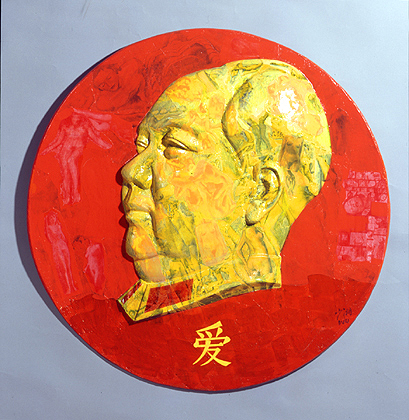
The Badge of Mao, a ceremonial award created by Mao Zedong towards the end of the Russo-Chinese war.
The last letter of Mao, sent to the Dalai Lama of Spain.
Why should I study the teachings of Buddha? The Jews, the Christians and the Hindus all boast covenants with the movers of the earth and the shakers of the heavens, and you only promise me a new life after I die.
I don't want to wait until my next life for my rewards. I want a prophet who protects me from my persecutors, who will smite my enemies before they overrun me and take my head from my body.
Don't you understand? The Russians are coming.
I am an old man, but I will give any God who is listening one last chance to protect me, return my empire to my hands, and restore the balance of the world. This is all I ask.
If you can give this to me, Buddha, then I will recieve you in my home.
After the capture of Nanjing and Saxon, all the provinces of the Chinese empire had fallen. For all intents and purposes, the Russo-Chinese war was over, but for Viktor Vasnetsov, there was one more thing that had to be done--he had to find the Chinese Emperor. Unfortunately, his searches turned up nothing, and it seemed for a time that he would die without fulfilling his final goal.
Viktor was a very old man. By 1371 AD, he was a hundred and seventeen years old and incapable of moving from his bed in Parthian. He looked around him and saw that the world was advancing in ways he could hardly understand. New technological advances were changing civilization; the Tsar had been overthrown; Boris Chicherin's liberal revolution had created a constitutional monarchy; the rise of a mercantile class was signalling the end of the age of the knight; and though he'd never recieved word, Viktor knew that his father was dead, and that he was the last Vasnetsov who would ever live. He woke up each day, ate a bowl of barley, and reminded his manservants that he was a childless artifact of the past, living only to see the end of an era.
On December 25th, 1371 AD, the end came to Parthian. Two men brought an incredibly old and ill Chinese man in Imperial dress to the Imperial Palace. The man claimed he was the Emperor, and that he wished to die in his home. Viktor Vasnetsov recieved him, and brought him to the throne room. With his own eyes, he verified that it was the true Emperor of China, Mao Zedong.
Both Mao and Viktor were too burdened with years to speak. Viktor motioned for his servants to put Mao Zedong on his throne, and he had his bed brought to the chamber so that he could rest beside his foe. Then they sat and stared at one another, silently, until Mao fell asleep.
The next morning, the manservants arrived to find that Viktor Vasnetsov had no t slept. "He is dead," he croaked. The Emperor of China died on his throne, and with him, the Chinese Empire.

Viktor refused to eat his bowl of barley, and waited beside Mao's corpse until lunch. Then he ordered his servants to bury it in the courtyard of the palace. He watched the proceedings with a critical eye, and once Mao was in the ground and given his final rites, he demanded that his servants bring him his bed.
Vasnetsov lay down amongst his sheets and stared into the west. When his servants reccomended that he move back into the palace and out of the tropical heat, Vasnetsov would say nothing but, "I broke my promise to my father."
For a time, nobody could elicit an explanation from him, until at sunset, as he stared into the solar fire and went blind, he said, "I never returned to Crimea. Forgive me, father."
That night, the last great general of the medieval era passed out of this world and into the history books. In his honor, the Russo-Chinese war officially ends then.
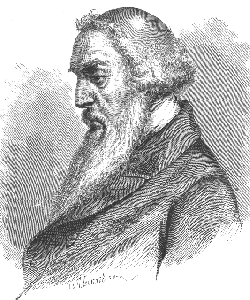
A wood engraving of the death portrait of Viktor Vasnetsov.
So far...
Whew. Next update, the technological and social aspects of The Changing Century, part 2! It'll also include a map of the world as we know it.

